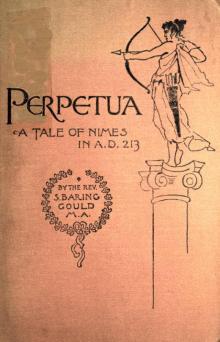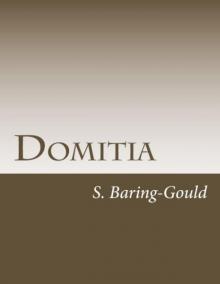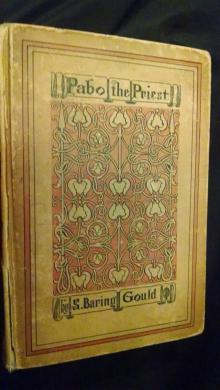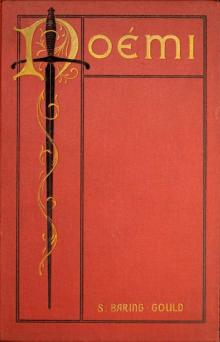- Home
- S. Baring-Gould
Domitia
Domitia Read online
"ROME IS BOILING OVER, AND WILL SCALD MANY FINGERS." _Page 89._]
DOMITIA
BY S. BARING-GOULD Author of "The Broom-Squire," "Bladys," "Mehalah," "Court Royal," Etc.
_Illustrated by_IZORA C. CHANDLER
NEW YORKFREDERICK A. STOKES COMPANYPUBLISHERS
_Copyright, 1898_, BY FREDERICK A. STOKES COMPANY.
_All rights reserved._
PRESSWORK BY THE UNIVERSITY PRESS, CAMBRIDGE, U.S.A.
CONTENTS
Book I I. The Port of Cenchraea II. An Ill-Omen III. Corbulo IV. There Is No Star V. The Ship of the Dead VI. I Do Not Know VII. The Face of the Dead VIII. The Sword of the Dead IX. Sheathed X. Ubi Felicitas? XI. The Veils of Ishtar XII. The Fall of the Veils XIII. To Rome! XIV. A Little Supper XV. The Lectisternium XVI. In the House of the Actor XVII. The Saturnalia of 69 XVIII. A Refugee XIX. The End of Vitellius XX. Changed Tactics XXI. The Virgin's Wreath XXII. Quoniam Tu Caius, Ego Caia! XXIII. The End of the Day XXIV. Albanum XXV. By a Razor XXVI. IntermezzoBook II I. An Appeal II. The Fish III. In the 'Insula' IV. Another Appeal V. Atrium Vestae VI. For the People VII. 'The Blues Have It!' VIII. The Lower Stool IX. Glyceria X. The Accursed Field XI. Again: The Sword of Corbulo XII. The Tablets XIII. The Hour of Twelve XIV. In the Tullianum XV. Drawing to the Light XVI. An Ecstasy XVII. Hail, Gladsome Light!FootnotesTranscriber's Note
DOMITIA.
BOOK I.
CHAPTER I.
THE PORT OF CENCHRAEA.
Flashes as of lightning shot from each side of a galley as she was beingrowed into port. She was a bireme, that is to say, had two tiers of oars;and as simultaneously the double sets were lifted, held for a momentsuspended, wet with brine, feathered, and again dipped, every single bladegleamed, reflecting the declining western sun, and together formed a flashfrom each side of the vessel of a sheaf of rays.
The bireme was approaching the entrance to the harbor of Cenchraea.
The one white sail was filled with what little wind breathed, and it shoneagainst a sapphire sea like a moon.
Now, at a signal the oars ceased to plunge. The sail was furled, and thegalley was carried into the harbor between the temple that stood on thenorthern horn of the mole, and the great brazen statue of Poseidon thatoccupied a rock in the midst of the entrance, driven forward by theimpulse already given her by the muscles of the rowers and the east windin the sail.
This Cenchraean harbor into which she swept was one of the busiest in theworld. Through it as through a tidal sluice rushed the current of tradefrom the East to the West, and from the Occident to the Orient. It wasplanted on a bay of the Saronic Gulf, and on the Isthmus of Corinth, atthe foot of that lovely range of mountains thrown up by the hand of God towall off the Peloponnesus as the shrine of intellectual culture and thesanctuary of Liberty.
And a furrow--like an artificial dyke--ran between this range and Hellasproper, a furrow nearly wholly invaded by the sea, but still leaving astrip of land, the Corinthian isthmus, to form a barrier between theEastern and the Western worlds.
On the platform at the head of a flight of marble steps before a temple ofPoseidon, in her open litter, lounged a lady, with the bloom of youth gonefrom her face, but artificially restored.
She was handsome, with finely moulded features and a delicate white hand,the fingers studded with rings, and a beautiful arm which was exposedwhenever any one drew near whose admiration was worth the acquisition. Itscharm was enhanced by armlets of gold adorned with cameos.
Her arched brows, dark in color, possibly owed their perfection of turnand their depth of color to dye and the skill of the artist who decoratedher every day, but not so the violet-blue of her large eyes, althoughthese also were enhanced in effect by the tinting of the lashes, and atouch of paint applied to their roots.
The lady, whose name was Longa Duilia, was attended by female slaves, whostood behind the litter, and by a freedman, Plancus, who was at her sidewith a set smile on his waxen face, and who bowed towards the lady everymoment to hear her remarks, uttered in a languid tone, and without hertroubling to turn her head to address him.
"He will soon be here," said the lady; "the bireme is in the port. I cansee the ruffle before her bows as she cuts the water."
"Like the wave in my lady's hair," sighed Plancus.
"Abominable!" exclaimed Duilia, "when the ripple in my hair is natural andabiding, and that in the water is made and disappears."
"Because, Mistress, the wavelets look up, see, and fall back in despair."
"That is better," said the lady.
"And the swelling sail, like your divine bosom, has fallen, as when----"
"Ugh! I should hope the texture of my skin was not like coarse sail-cloth;get behind me, Plancus. Here, Lucilla, how am I looking? I would have mylord see me to the best advantage."
"Madam," said the female slave, advancing, "the envious sun is about tohide his head in the west. He cannot endure, after having feasted on yourbeauty, to surrender it to a mortal."
"Is not one eyebrow a trifle higher than the other?" asked Duilia, lookingat herself in a hand mirror of polished metal.
"It is indeed so, lady, but has not the Paphian Goddess in the statue ofPhidias the same characteristic? Defect it is not, but a token ofdivinity."
"Ah," said Duilia, "it is hereditary. The Julian race descends from VenusGenetrix, and I have the blood of the immortal ancestress in me."
"Much diluted," muttered Plancus into the breast of his tunic; he was outof humor at the failure of his little simile of the sail.
"By the way," said the lady; "the stay in this place Cenchraea ispositively intolerable. No society, only a set of merchants--rich and allthat sort of thing--but nobodies. The villa we occupy is undignified anduncomfortable. The noise of the port, the caterwauling of sailors, and thesmell of pitch are most distasteful to me. My lord will hardly tarryhere?"
"My lord," said the freedman, pushing forward, "he who subdued theParthians, and chained the Armenians, to whom all Syria bowed, arrives tocast himself at your ladyship's feet, and be led by you as a captive inyour triumphal entry into the capital of the world."
"You think so, Plancus." She shook her head, "He is an obstinateman--pig-headed--I--I mean resolute in his own line."
"Madam, I know you to be irresistible."
"Well, I desire to leave this odious place. I have yawned here throughthree entire months."
"And during these months, the temple of Aphrodite has been deserted, andthe approaches grass-grown."
"How would my Lady like to remove to Corinth?" said Lucilla. "The vesselwill be taken to Diolcus, and there placed on rollers, to be drawn acrossthe isthmus."
"Oh! Corinth will be noisier than this place, and more vulgar, becausemore pretentious. Only money-lending Jews there. Besides, I have taken anaversion to the place since the death of my physician. As the Gods loveme, I not see the good of a medical attendant who is so ignorant as toallow himself to die, and that at such an inconvenient moment as thepresent. By the Great Goddess! what impostors there be. To think that foryears I committed the care of my precious health to his bungling hands!Plancus, have you secured another? I suffer frightfully at sea."
"A sure token of your divine origin," said the steward. "The Foam-born(Venus) rose out of and left the waves because the motion of themdisagreed with her."
"There is a good deal in that," observed Longa
Duilia. "Plancus, have yousecured another? I positively cannot across Adria without one to hold myhead and supply anti--anti--what do you call them?"
"Madam," said the freedman, rubbing his hands together, "I have devoted myenergies to your service. I have gone about with a lantern seeking anhonest physician. I may not have been as successful as I desired, but Ihave done my utmost."
"I prithee--have done with this rodomontade and to the point. Have yousecured one? As the Gods love me! it is not only one's insides that getupset at sea, but one's outside also becomes so tousled and tumbled--thatthe repairs--but never mind about them. Have you engaged a man?"
"Yes, my Lady, I have lighted on one Luke, a physician of Troas; he isdesirous of proceeding to Rome, and is willing to undertake the charge ofyour health, in return for being conveyed to the capital of the world atyour charges."
"I make you responsible for his suitability," said Longa Duilia.
"Body of Bacchus!" she exclaimed suddenly, after a pause, "Where is thechild?"
"Where is the lady Domitia Longina?" asked Plancus, as he looked abouthim.
"The lady Domitia, where is she?" asked Lucilla.
"The lady Domitia?"--passed from one to another.
"Where is she? What has become of her? As the Gods love me--you are a packof fools. The more of you there are, so much the more of folly. You havelet her gallop off among the odious sailors, and she will come back rankwith pitch. Lucilla, Favonia, Syra, where is she?"
Duilia sat upright on her seat, and her eyes roamed searchingly in everydirection.
"I never met with such a child anywhere, it is the Corbulo blood in her,not mine. The Gods forbid! O Morals!"
"Madam," said a slave-girl coming up. "I saw her with Eboracus."
"Well, and where is Eboracus. They are always together. He spoils thechild, and she pays him too much consideration. Where are they?"
The slaves, male and female, looked perplexedly in every direction.
"Perhaps," said Plancus, "she has gone to the altar of Poseidon to offerthere thanks for the return of her father."
"Poseidon, nonsense! That is not her way. She has been in a fever eversince the vessel has been sighted, her cheeks flaming and in a fidget asif covered with flying ants. Find the girl. If any harm shall have come toher through your neglect, I will have you all flayed--and hang the cost!"
She plucked a bodkin from her dress, and ran it into the shoulder of theslave-woman, Favonia, who stood near her, and made her cry out with pain.
"You are a parcel of idle, empty-headed fools," exclaimed the alarmed andirritated mother, "I will have the child found, and that instantly. Yougirls, you have been gaping, watching the sailors, and have not had an eyeon your young mistress, and no concern for my feelings. There is no moreputting anything into your heads than of filling the sieves of theDanaides."
"Madam," said Plancus, for once without a smile on his unctuous face, "youmay rest satisfied that no harm has befallen the young lady. So long asEboracus is with her, she is safe. That Briton worships her. He wouldsuffer himself to be torn limb from limb rather than allow the least illto come to her."
"Well, well," said the lady impatiently, "we expect all that sort of thingof our slaves."
"Madam, but do we always get it?"
"We! The Gods save me! How you talk. _We!_ We, indeed. Pray what are youto expect anything?"
"The other day, lady," hastily continued the steward eager to allay theebullition he had provoked. "The other day, Eboracus nigh on killed a manwho looked with an insolent leer at his young mistress. He is like afaithful Molossus."
"I do not ask what he is like," retorted the still ruffled lady, "I askwhere she is."
Then one of the porters of the palanquin came forward respectfully andsaid to the steward:--"If it may please you, sir, will you graciouslyreport to my Lady that I observed the young mistress draw Eboracus aside,and whisper to him, as though urging somewhat, and he seemed to demur, buthe finally appeared to yield to her persuasions, and they strolledtogether along the mole."
Longa Duilia overheard this. It was not the etiquette for an underling toaddress his master or mistress directly unless spoken to.
She said sharply:--"Why did not the fellow mention this before? Give himthirty lashes. Where did they go, did he say?"
"Along the mole."
"Which mole?"
"Madam, Carpentarius is afraid of extending his communication lest heincrease the number of his lashes."
"Well, well!" exclaimed the mistress, "We may remit the lashes--let himanswer."
"Carpentarius," said the steward, "Her ladyship, out of the superabundanceof her compassion, will let you off the thirty lashes, if you say where beEboracus and the young lady, your mistress Domitia Longina."
"Sir," answered the porter, "that I cannot answer positively; but--unlessmy eyes deceive me, I see a small boat on the water, within it a rower anda young girl."
"By the Immortal Brothers! he is right," exclaimed Plancus. "See, lady,yonder is a cockle boat, that has been unmoored from the mole, and therebe in it a rower, burly, broadbacked, who is certainly the Briton, and inthe bow is as it were a silver dove--and that can be none other than yourdaughter."
"As the Gods love me," gasped Duilia, throwing herself back in the litter;"what indelicacy! It is even so, the child is besotted. She dotes on herfather, whom she has not seen since we left Antioch. And she has actuallygone to meet him. O Venus Kalypyge! What are we coming to, when childrenact in this independent, indecent manner. O Times! O Morals!"

 Perpetua. A Tale of Nimes in A.D. 213
Perpetua. A Tale of Nimes in A.D. 213 Domitia
Domitia Pabo, the Priest: A Novel
Pabo, the Priest: A Novel Noémi
Noémi The Book of Were-Wolves
The Book of Were-Wolves